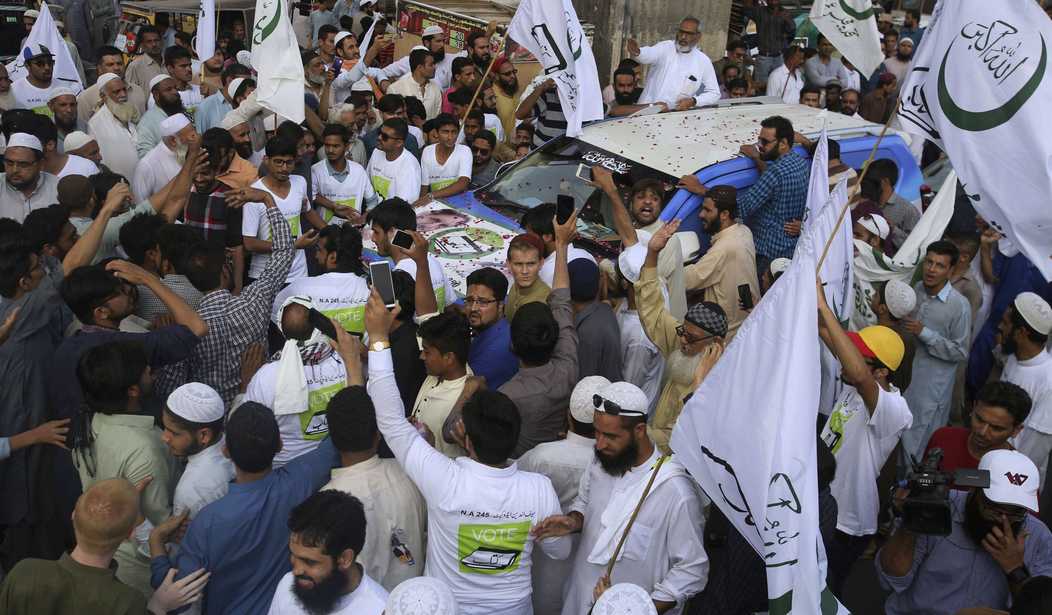Over a year after a mass uprising ousted the former Prime Minister Sheikh Hasina’s administration, Bangladeshi journalists continue to experience threats, attacks and even murders in retaliation for their reporting. Dozens of opposition journalists are also the subject of police investigations and discrimination in apparent reprisals against their work.
This past October, Hindu journalist Trina Roy Chowdhury and her husband (Promithias Chowdhury) were targeted by Islamists after they exposed atrocities against Hindus. While her husband was assaulted, Trina received gang-rape threats. Rather than offering them protection, the police allegedly sided with the attackers.
The couple runs a news portal in Bangladesh called TheNewse.com. The attacks and threats against the journalists started after they posted on their website reports exposing targeted violence, forced conversions, and temple desecrations in multiple districts, according to the Hindu Post.
Nobel Laureate Muhammad Yunus took charge of Bangladesh’s interim government in August of last year after Hasina resigned and fled the country following weeks of student-led protests, which were later hijacked by Islamists.
Since then, hundreds of criminal cases have been lodged against dissident journalists. Furthermore, between October and November 2024, Bangladesh’s interim government canceled the press accreditations of 167 journalists.
Meanwhile, violence against reporters remains a severe problem in the country. The city of Gazipur, north of the capital Dhaka, witnessed two exceptionally violent attacks on journalists. On August 7, Dainik Pratidiner Kagoj reporter Asaduzzaman Tuhin (age 38) was killed with machete blows by armed men whom he had filmed while they were chasing a young man in a market.
The day before, another journalist, Anwar Hossain, 35, a reporter for Dainik Bangladesher Alo, was violently attacked in the street while investigating cases of extortion. He was rushed to Gazipur Public Hospital in critical condition.
In another case of fatal retaliatory violence against reporters, Khandaker Shah Alam, a correspondent for the Daily Matrijagat, succumbed to his injuries on June 26.
These are not isolated cases. In 2025, reporters across Bangladesh have faced violence and harassment, with the Committee to Protect Journalists (CPJ) documenting at least 10 such incidents, most of which were carried out by members or affiliates of the Bangladesh Nationalist Party (BNP) and its student wing, Chhatra Dal. In several instances, journalists sustained serious injuries or were prevented from reporting after footage was deleted or phones seized, including Bahar Raihan, Abdullah Al Mahmud, and Rocky Hossain.
Others have faced threats from supporters of different political parties and the student groups that led the protests against PM Hasina. Reporters covering Islamist opposition groups like Jamaat-e-Islami or its student wing, Islami Chhatra Shibir, have come under particular pressure. On June 9, Hasanat Kamal, editor of EyeNews.news, told CPJ that he had fled to the United Kingdom after being falsely accused by Islami Chhatra Shibir of participating in a violent student protest. Anwar Hossain, a journalist for the local daily Dabanol, told CPJ he was threatened by Jamaat supporters after he published negative reports about a local party leader.
In February 2025, Reporters without Borders (RFS) issued a press release, stating that "violent attacks on journalists are surging in Bangladesh:
Since the beginning of February, serious attacks on journalists have been on the rise, including beatings by baton and hammer — carried out by police officers and political activists alike — and storming newsrooms.
[Journalists in Bangladesh] are being assaulted while reporting, subjected to physical retaliation for their articles, and their newsrooms are being stormed by protesters. RSF calls on the authorities to prosecute all those responsible for these attacks, to put an end to this intolerable cycle of violence, and to ensure the safety of media professionals.
Meanwhile, many journalists remain behind bars over a year after the new Bangladesh leader vowed reforms. On March 5, for instance, CPJ reported that in a Dhaka courtroom, journalist Farzana Rupa stood without a lawyer while a judge moved to register yet another murder case against her. Already in jail, she quietly asked for bail. The judge said the hearing was only procedural. “There are already a dozen cases piling up against me,” she said. “I’m a journalist. One murder case is enough to frame me.”
Rupa, a former chief correspondent at privately owned broadcaster Ekattor TV, now faces nine murder cases. Her husband, Shakil Ahmed, the channel’s former head of news, is named in eight.
In addition to such legal charges, CPJ has documented physical attacks against journalists, threats from political activists, and exile. At least 25 journalists are under investigation for genocide by Bangladesh’s International Crimes Tribunal – a charge that has been used to target figures linked to the former Hasina government.
A CPJ review of legal documents and reports found that journalists are often added to First Information Reports (FIRs) – documents that open an investigation – long after they are filed. In May, UN experts raised concern that over 140 journalists have been charged with murder since last year’s protests.
On March 21, several human rights organizations – including Amnesty International, Article 19, Asian Forum for Human Rights & Development, CIVICUS: World Alliance for Citizen Participation, Fortify Rights, Front Line Defenders, Human Rights Watch, PEN America, and The Committee to Protect Journalists – issued a press release. They noted with alarm the number of arrests and incidents of harassment and violence against individuals and human rights defenders exercising their right to freedom of expression in Bangladesh. The press release said, in part:
It is not only journalists that have faced attacks, but authors and poets and human rights defenders too. On 10 February, a group of individuals attacked a book stall at the Amar Ekushey Book Fair, following claims that the stall was selling books authored by Taslima Nasreen, who was previously accused of publishing writing which insulted Islam. She fled Bangladesh in 1994 after receiving death threats. While Chief Advisor Muhammad Yunus ordered an investigation into the attack, there is no indication that perpetrators have been held accountable. This incident took place against the backdrop of increased restrictions on freedom of expression on grounds of protecting religion or religious sentiments. For example, on 13 February, Sohel Galib, a poet, was arrested and charged under the Code of Criminal Procedure for ‘hurting religious sentiment’. It was alleged that a poem written by Galib made derogatory remarks about Islam. On March 3, Dhaka Cyber Tribunal ordered the Criminal Investigation Department to investigate a case brought by a private citizen against Rakhal Raha, a human rights defender and member of the Textbook Revision Committee, for allegedly hurting religious sentiment in a Facebook post where he wrote a satirical poem questioning freedom of expression related to the arrest of Sohel Galib.
Bangladesh’s legal framework on Cyber Security also enables impermissible restrictions on freedom of expression. Police in Kurigram sought the arrest of a writer and activist, Nahid Hasan after a case was filed against him by a private individual on 25 February for allegedly ‘hurting religious sentiment’. The case was filed under the Cyber Security Act (CSA), a draconian piece of legislation which has previously been used against government critics, human rights defenders, journalists and bloggers, in a manner which contravenes their right to freedom of expression. The provision in the CSA relating to hurting religious sentiment has, in the past, been used to curb freedom of expression and harass human rights defenders under the guise of religion.
Bangladesh’s general elections are expected to take place this upcoming February. A referendum on the July Charter, a political declaration over the constitutional, electoral, and administrative reforms made since the anti-government revolt in 2024, will also take place alongside the 2026 election.
The revolt was hijacked by various national Islamist groups. The interim government has since enabled Islamists by removing a ban against them, releasing terrorists from jails, and allowing attacks against journalists, women and religious minorities to go unpunished. However, there is not a single case in the history of Islam that shows that an increase in Islamization has led to more security and stability, democracy, and an improvement in human rights.
Given the fact that the Joe Biden administration helped pave the way to Yunus's takeover of the country, the Trump administration should right this wrong in U.S. foreign policy and end the appeasement of Bangladeshi Islamists, who will most likely further destabilize not only Bangladesh but the entire South Asia region.
Editor’s Note: Help us continue to report the truth about why America has a job crisis, and other critical topics that affect our lives and American culture.
Join PJ Media VIP and use promo code FIGHT to get 60% off your membership.










Join the conversation as a VIP Member